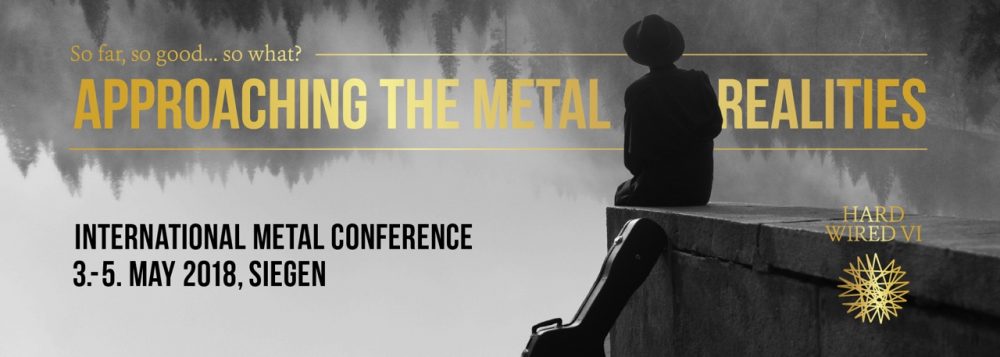
Hard Wired VI: So far, so good…so what? Approaching the Metal Realities
Artur-Woll-Haus, University of Siegen, (Germany)
May 03-05, 2018
Organisers: Florian Heesch, Reinhard Kopanski, Laura Patrizia Fleischer and Aleksandar Golovin (University of Siegen; Faculty II; Department of Arts and Music; Popular Music and Gender Studies)
Conference languages are English and German (with simultaneous translation provided).
Is heavy metal a form of aesthetic escapism or an alternative view on the so-called everyday reality? What is the relationship between metal and reality? What do we even mean when we speak of realities?
The academic discourse on metal has become wide-spread, which is apparent in the multitude of monographs, edited anthologies, as well as its very own transdisciplinary academic journal (Metal Music Studies). However, establishing metal studies as an autonomous research field faces numerous challenges: legitimisation of the research subject, critical views on alleged fan perspectives, and the corresponding accusations that metal researches merely seek to validate their personal musical preferences (for example, along the lines of the so-called black metal theory), together with the genre’s often attributed escapism and loss of touch with reality.
At the same time, scene members, fans and listeners regard metal as a part of their personal reality. In the life of the “professionally interested” (Professionell Interessierte, Ronald Hitzler), e.g. journalists, musicians and festival organisers, metal is a vital part of the working or economic base. The ‘metal realities’ must be considered in the plural and in relation to aspects of diversity, as their mode of experience can be quite different in the various linguistic, geographical and cultural spaces that constitute the term.
So far, so good… so what? The sixth edition of the workshop/conference “Hard Wired” aims to bring these metal realities together and attempts to overcome geographical as well as language barriers in the field of metal studies. The interdisciplinary questions and problems will be approached by engaging with the various voices of the metal community, as to render visible the gaps and overlaps of the many metal realities. In order to enable non-academics to participate, all presentations will be open to the broader public.
We are particularly interested in the following questions:
- How are different metal realities constructed and/or influenced by discourses and power relations?
- What is the relationship between metal realities and the societal reality of everyday life?
- What are the transitions between fiction and reality in the “fantasy world of metal”?
- How do the realities of metal studies position themselves in regards to established academic disciplines and popular music studies?
- (How) are metal realities changing because of the Internet? (i.e. Youtube, Bandcamp?
